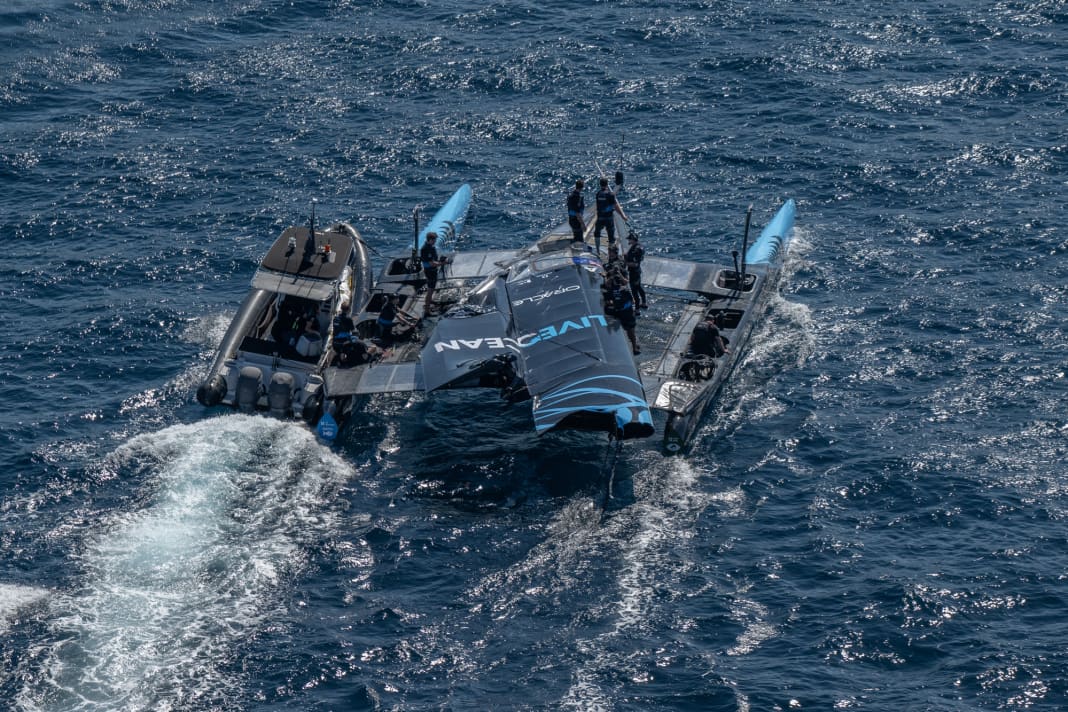SailGP: Shock wing breakage for the Kiwis - "All we heard was a huge bang"
Tatjana Pokorny
· 09.09.2023






The first images of the Kiwi's wing breaking came shortly after the end of the three races on day one of the French SailGP in Saint-Tropez. They showed shocking scenes out of nowhere, when the regatta day already seemed to be over: the largest of the three wing rigs used in the SailGP, measuring 29 metres in height and designed for light winds, had collapsed on board the New Zealand F50 catamaran on its way into the harbour. The fact that no one on board was injured when the parts hit the water was nothing short of a miracle.
The wing could so easily have fallen at a different angle. We're just glad that nobody was in the centre of the boat where the middle section landed" (Peter Burling)
"It could have turned out much worse. We are all so glad that no one on the Kiwis was injured," said Erik Heil, helmsman of the Germany SailGP team, late in the afternoon in the harbour of Saint-Tropez. New Zealand helmsman Peter Burling, two-time America's Cup winner and Olympic champion in the 49er, said: "Fortunately, everyone on board is safe. The wing could so easily have fallen at a different angle. We were all on the starboard side of the F50 and were just touching down - something we've done 30 or 40 times today. Then we just heard a huge bang and watched everything disintegrate. Luckily, everyone is fine. We're just glad no one was in the centre of the boat where the middle section landed."
The incident on Saturday afternoon was another vivid reminder of the potential dangers inherent in the SailGP races and their appeal. Why the rig exploded was initially incomprehensible even to the Kiwis themselves. Peter Burling said: "To be honest, I have no idea. We didn't do anything differently on board. We just put the boat on gently. We just went round to say hello to a few friends at the end of the day. It's now in the hands of the technical team and the organisers to see what they can achieve by tomorrow."
It's all for nothing if we can't sail tomorrow" (Peter Burling)
It would be bitter for the Kiwis not to be able to contest the second day due to a technical knockout. "We are in the lead with Denmark after day one - we are really proud of that as a group, but it will all be for nothing if we can't sail tomorrow," Peter Burling also realised in the evening in Saint-Tropez. As the conditions on Sunday are expected to be similar to Saturday's light conditions, the sailors are expecting the largest of the three possible wing sails to be used again. At first glance, the wing of the Kiwis did not appear to be repairable overnight, but the efforts had already begun in the evening.
Meanwhile, the Germany SailGP team experienced a day with a few dampeners, but also very motivating rays of hope in their rise in the Formula 1 of sailing. In only their third regatta, the crew led by helmsman Erik Heil, who is new to the professional league, finished 7th, 9th and 6th in the fast-paced fleet of F50 foilers on the Côte d'Azur. As a result, Team Germany initially lined up in eighth place in France.
A false start of less than a second cost a better position
Erik Heil and his crew with the German-Brazilian 49er FX double Olympic champion and strategist Kahena Kunze, the British wing trimmer and 49er Olympic champion Stuart Bithell, flight controller James Wierzbowski and the grinder group with Jonathan Knottnerus-Meyer from Kiel, Dan Morris and Joe Sullivan missed out on an even better result due to an early start of less than a second.
It is clear to see that the team of co-owners Thomas Riedel and four-time Formula 1 world champion Sebastian Vettel is getting better and better. "We were 'on fire' today," said Erik Heil in the evening in Saint-Tropez. After the first two regattas in the USA, the two-time Olympic bronze medallist from the Norddeutscher Regatta Verein and his team have raised their sights and set themselves a higher bar.
Now more than 50 per cent of our energy has to go into the launches" (Erik Heil)
Erik Heil explains: "When we started the SailGP very quickly, we initially wanted to get round the course in one piece and finish the races without breaking or endangering others or ourselves. Now more than 50 per cent of our energy has to go into the starts. Nothing has higher priority." This approach and the associated increased confidence in handling the racing catamaran was clearly evident on Saturday off Saint-Tropez, even if not everything went perfectly.
The day before, the Germany SailGP team had already achieved the fastest speed of the fleet in the last training session with more than 76 kilometres per hour. The German team's objective for the last two fleet races on Sunday has not changed. "Good starts are still the top priority," said Erik Heil, setting the pace for the day of decisions. The 2023/2024 SailGP season will be sailed for prize money totalling five million US dollars. The winners of the season will receive one million US dollars.

